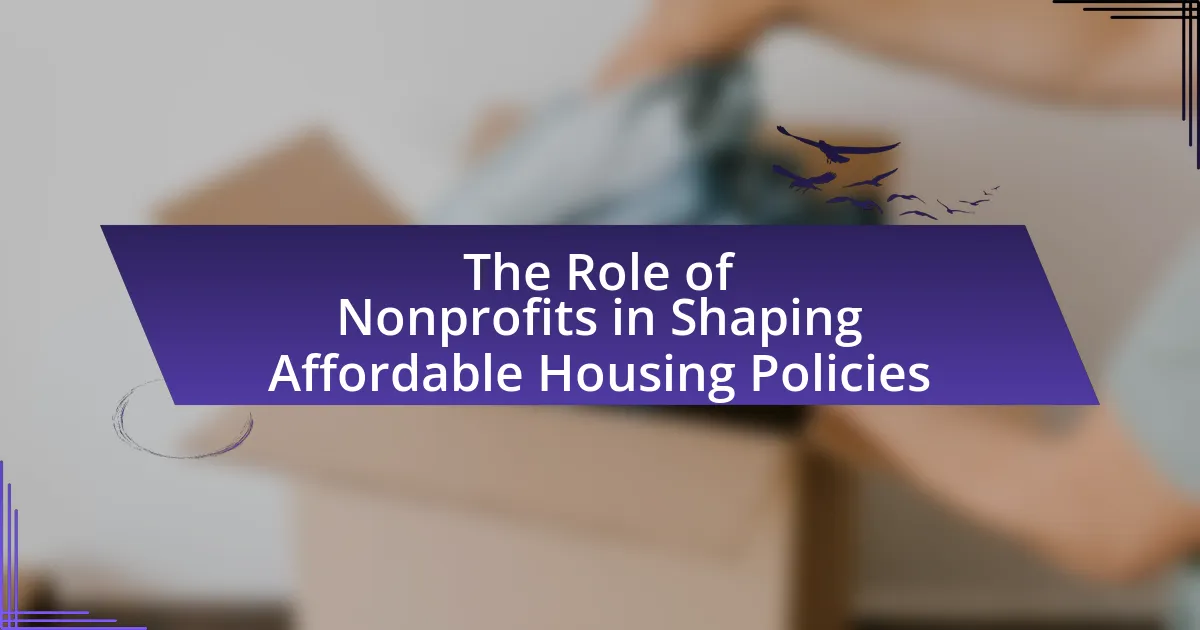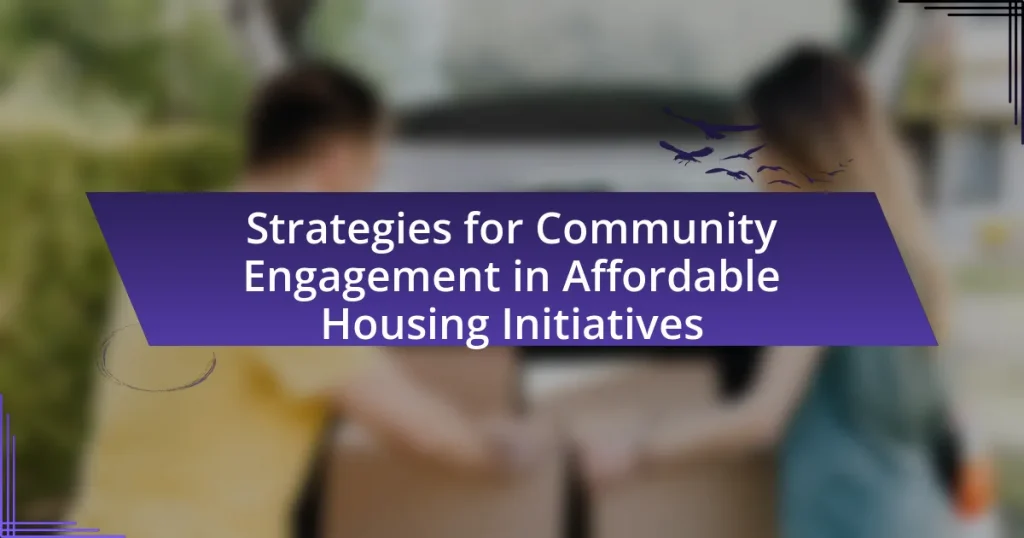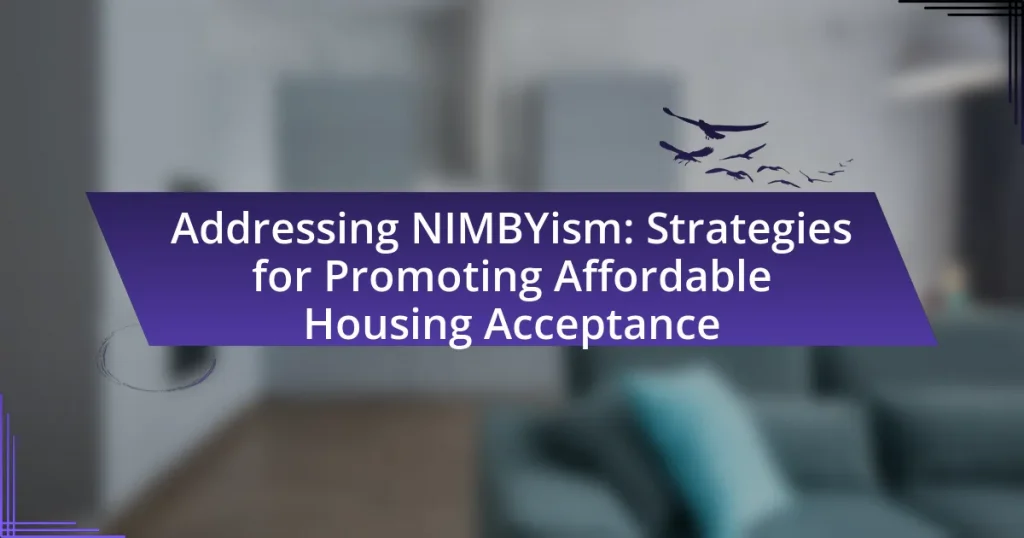Nonprofits play a vital role in shaping affordable housing policies by advocating for equitable access and influencing legislation through community organizing, research, and collaboration with government entities. They mobilize support for affordable housing initiatives, provide critical data to policymakers, and serve as intermediaries between communities and decision-makers. Despite facing challenges such as limited funding and regulatory hurdles, nonprofits employ various strategies, including public awareness campaigns and partnerships, to address the needs of underserved populations and advocate for systemic changes in housing policy. Their involvement is essential in bridging the gap in affordable housing availability and ensuring that the voices of low-income residents are represented in policy discussions.
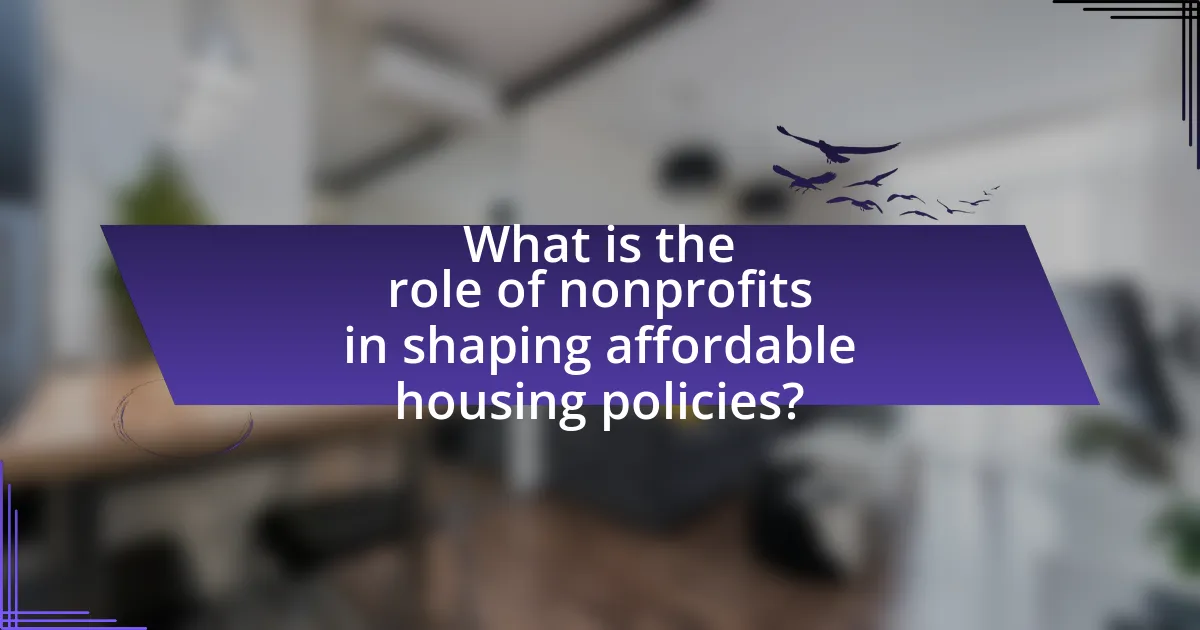
What is the role of nonprofits in shaping affordable housing policies?
Nonprofits play a crucial role in shaping affordable housing policies by advocating for equitable housing access and influencing legislation. They engage in community organizing, provide research and data to support policy changes, and collaborate with government entities to address housing needs. For instance, organizations like the National Low Income Housing Coalition have successfully lobbied for increased funding for affordable housing programs, demonstrating their impact on policy outcomes. Additionally, nonprofits often serve as intermediaries between communities and policymakers, ensuring that the voices of low-income residents are heard in the decision-making process.
How do nonprofits influence housing policy decisions?
Nonprofits influence housing policy decisions by advocating for affordable housing initiatives and providing critical data to policymakers. They engage in lobbying efforts, mobilize community support, and conduct research that highlights the need for affordable housing, which can sway legislative priorities. For instance, organizations like the National Low Income Housing Coalition regularly publish reports that quantify housing needs, demonstrating the gap between income levels and housing costs, thereby influencing policymakers to consider these factors in their decisions. Additionally, nonprofits often collaborate with local governments to implement housing programs, ensuring that community voices are represented in policy discussions.
What strategies do nonprofits use to advocate for affordable housing?
Nonprofits advocate for affordable housing through strategies such as community organizing, policy advocacy, and public awareness campaigns. Community organizing involves mobilizing residents to engage in grassroots efforts, which can lead to increased pressure on local governments to prioritize affordable housing initiatives. Policy advocacy includes lobbying for legislation that supports affordable housing funding and zoning reforms, evidenced by organizations like the National Low Income Housing Coalition, which actively campaigns for policy changes at both state and federal levels. Public awareness campaigns aim to educate the community about housing issues, utilizing data to highlight the need for affordable housing solutions, as seen in initiatives that showcase the impact of housing instability on health and education outcomes.
How do nonprofits collaborate with government agencies in housing policy?
Nonprofits collaborate with government agencies in housing policy by engaging in partnerships that leverage resources, expertise, and community connections to address housing needs. These collaborations often involve nonprofits providing data and research to inform policy decisions, advocating for affordable housing initiatives, and implementing programs funded by government grants. For instance, the National Low Income Housing Coalition works with local governments to develop strategies that increase affordable housing availability, demonstrating the effectiveness of such partnerships in shaping housing policy.
Why are nonprofits essential in the affordable housing sector?
Nonprofits are essential in the affordable housing sector because they address gaps in housing availability and affordability that the private market often overlooks. These organizations mobilize resources, advocate for policy changes, and develop affordable housing projects that meet community needs. For instance, according to the National Low Income Housing Coalition, there is a shortage of 7 million affordable rental homes for extremely low-income renters in the United States. Nonprofits play a critical role in bridging this gap by providing services such as housing counseling, financial assistance, and community development initiatives, which directly contribute to increasing access to affordable housing for vulnerable populations.
What unique perspectives do nonprofits bring to housing policy discussions?
Nonprofits bring community-centric perspectives to housing policy discussions, emphasizing the needs and voices of marginalized populations. They often advocate for affordable housing solutions that prioritize social equity, reflecting their mission to serve vulnerable communities. For instance, nonprofits like Habitat for Humanity focus on building homes for low-income families, demonstrating the impact of grassroots initiatives on policy formulation. Their involvement often leads to policies that address systemic inequalities, as evidenced by studies showing that nonprofit advocacy can influence local zoning laws and funding allocations for affordable housing projects.
How do nonprofits address the needs of underserved communities in housing?
Nonprofits address the needs of underserved communities in housing by providing affordable housing options, advocacy, and support services. They often develop low-income housing projects, which can include building new homes or renovating existing properties to meet the needs of low-income families. For instance, organizations like Habitat for Humanity construct homes for those in need, ensuring that housing is accessible and affordable. Additionally, nonprofits engage in advocacy efforts to influence housing policies at local, state, and federal levels, pushing for legislation that supports affordable housing initiatives. According to the National Low Income Housing Coalition, there is a shortage of 7 million affordable rental homes for extremely low-income renters, highlighting the critical role nonprofits play in addressing this gap through their programs and advocacy work.
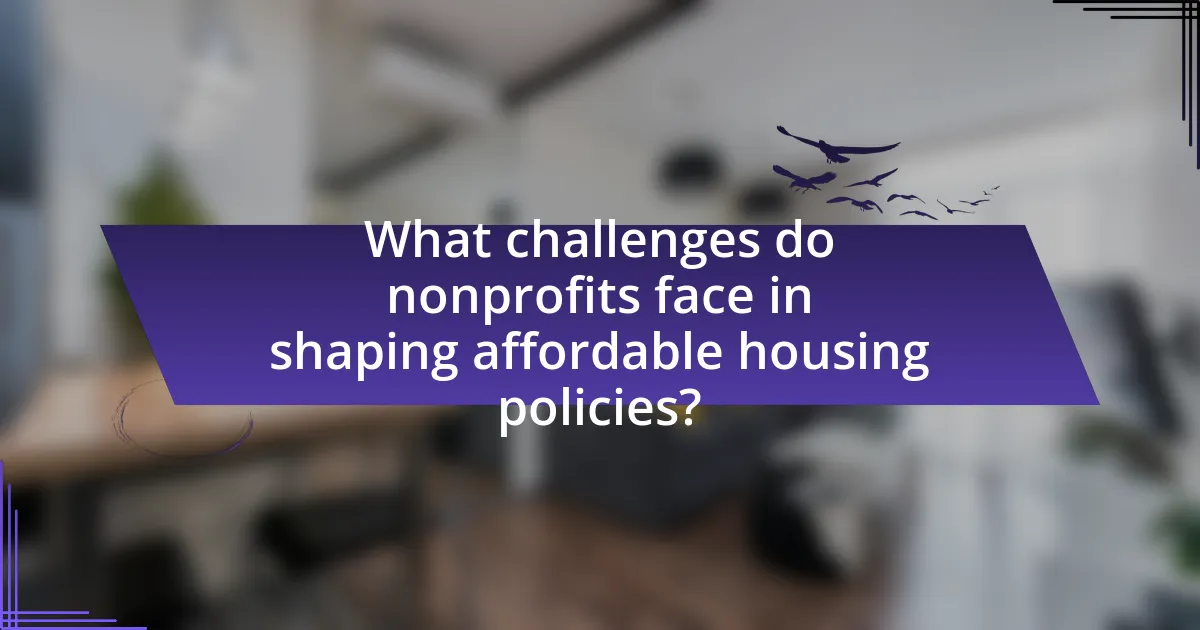
What challenges do nonprofits face in shaping affordable housing policies?
Nonprofits face significant challenges in shaping affordable housing policies, primarily due to limited funding and resources. Many nonprofits rely on grants and donations, which can be inconsistent and insufficient to support comprehensive policy initiatives. Additionally, they often encounter bureaucratic hurdles when navigating government regulations and zoning laws, which can impede their ability to advocate effectively for policy changes. For instance, a report by the National Low Income Housing Coalition highlights that over 70% of low-income renters are cost-burdened, yet nonprofits struggle to influence policy reforms that address this issue due to their limited political clout and access to decision-makers. Furthermore, competition among nonprofits for funding and attention can dilute their collective impact on housing policy advocacy.
How do funding limitations impact nonprofit housing initiatives?
Funding limitations severely restrict nonprofit housing initiatives by reducing their capacity to develop, maintain, and expand affordable housing projects. Nonprofits often rely on grants, donations, and government funding, and when these sources are limited, they face challenges in securing necessary resources for construction, operational costs, and community services. For instance, a report from the National Low Income Housing Coalition indicates that nearly 7 million low-income renters face severe housing cost burdens, highlighting the critical need for adequate funding to address housing shortages effectively. Without sufficient financial support, nonprofits struggle to meet the growing demand for affordable housing, ultimately impacting their ability to influence housing policies and provide stable living conditions for vulnerable populations.
What are the common sources of funding for nonprofit housing organizations?
Common sources of funding for nonprofit housing organizations include government grants, private donations, corporate sponsorships, and foundation grants. Government grants, such as those from the U.S. Department of Housing and Urban Development, provide significant financial support for affordable housing initiatives. Private donations from individuals and businesses contribute essential funds, while corporate sponsorships often involve partnerships that enhance resources for housing projects. Additionally, foundation grants from philanthropic organizations, like the Ford Foundation, specifically target housing and community development, further bolstering the financial capabilities of nonprofit housing organizations.
How can nonprofits overcome financial barriers to influence policy?
Nonprofits can overcome financial barriers to influence policy by diversifying funding sources and building strategic partnerships. By securing grants from foundations, engaging in fundraising campaigns, and forming alliances with businesses and other organizations, nonprofits can enhance their financial stability. For instance, the National Low Income Housing Coalition successfully leverages partnerships with various stakeholders to amplify its advocacy efforts, demonstrating that collaboration can lead to increased resources and greater policy impact. Additionally, nonprofits can utilize data-driven approaches to showcase the effectiveness of their programs, attracting more funding and support from donors who prioritize measurable outcomes.
What regulatory hurdles do nonprofits encounter in housing policy advocacy?
Nonprofits encounter several regulatory hurdles in housing policy advocacy, including restrictions on lobbying activities, compliance with federal and state regulations, and limitations on funding sources. These organizations must navigate the Internal Revenue Service’s guidelines, which restrict the amount of lobbying they can engage in without jeopardizing their tax-exempt status. For instance, under IRS rules, 501(c)(3) organizations are prohibited from participating in political campaigns and can only engage in limited lobbying activities, which can hinder their ability to advocate effectively for housing policies. Additionally, nonprofits often face complex zoning laws and local ordinances that can impede their initiatives. These regulatory challenges can significantly limit the capacity of nonprofits to influence housing policy and advocate for affordable housing solutions.
How do zoning laws affect nonprofit efforts in affordable housing?
Zoning laws significantly impact nonprofit efforts in affordable housing by dictating land use, density, and building types, which can either facilitate or hinder the development of affordable units. For instance, restrictive zoning regulations may limit the construction of multi-family housing, thereby reducing the availability of affordable options. According to a report by the National Low Income Housing Coalition, areas with more flexible zoning laws tend to have a higher supply of affordable housing, demonstrating that zoning can directly influence the capacity of nonprofits to address housing shortages. Additionally, nonprofits often face challenges in navigating complex zoning processes, which can delay projects and increase costs, further complicating their mission to provide affordable housing solutions.
What role does public perception play in nonprofit housing initiatives?
Public perception significantly influences nonprofit housing initiatives by shaping community support and funding opportunities. When the public views these initiatives positively, it often leads to increased donations, volunteer involvement, and collaboration with local governments. For instance, a study by the Urban Institute found that communities with favorable perceptions of nonprofit housing efforts are more likely to approve zoning changes and support funding measures, which are crucial for the success of such initiatives. Conversely, negative public perception can result in opposition, reduced funding, and challenges in project implementation, highlighting the critical role that community attitudes play in the effectiveness of nonprofit housing programs.
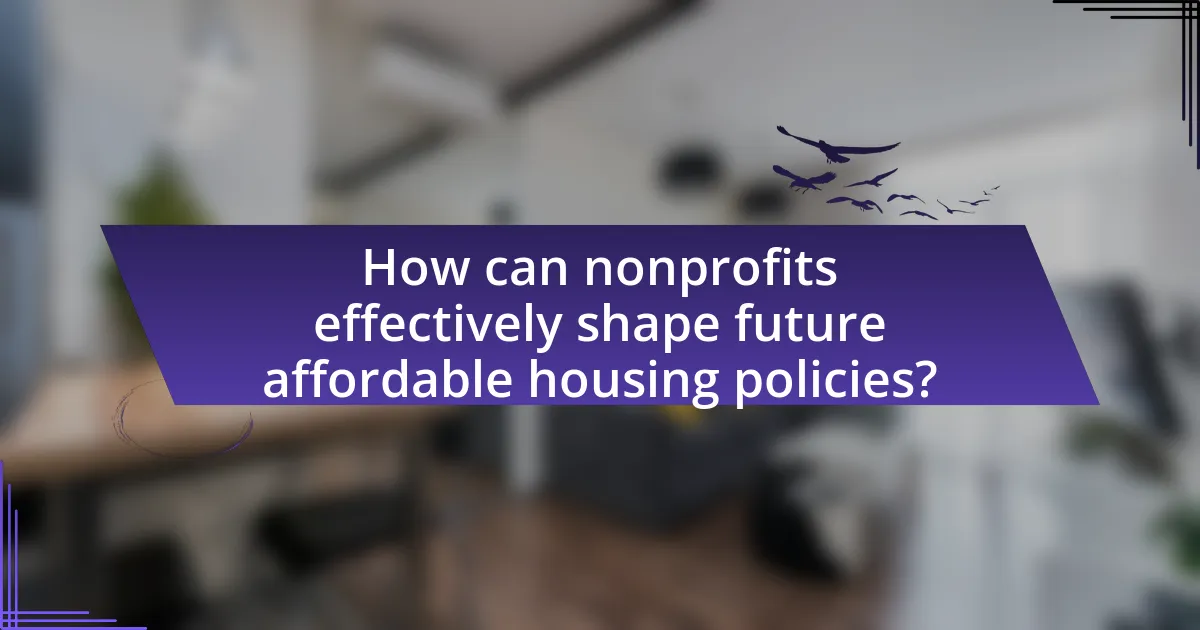
How can nonprofits effectively shape future affordable housing policies?
Nonprofits can effectively shape future affordable housing policies by engaging in advocacy, conducting research, and collaborating with stakeholders. Advocacy efforts, such as lobbying for policy changes and raising public awareness about housing issues, can influence lawmakers and public opinion. For instance, organizations like the National Low Income Housing Coalition have successfully campaigned for increased funding for affordable housing programs, demonstrating the impact of organized advocacy. Additionally, conducting research on housing needs and best practices provides data-driven insights that can inform policy decisions. Collaborating with government agencies, private sector partners, and community groups allows nonprofits to create comprehensive solutions that address local housing challenges. This multifaceted approach ensures that the voices of those affected by housing policies are heard and considered in the decision-making process.
What innovative approaches are nonprofits adopting in housing advocacy?
Nonprofits are adopting innovative approaches in housing advocacy by leveraging technology, community engagement, and policy collaboration. For instance, organizations are utilizing data analytics to identify housing needs and trends, which allows for targeted interventions. Additionally, nonprofits are fostering community-led initiatives that empower residents to participate in decision-making processes regarding housing developments. Collaborative efforts with local governments and private sectors are also being emphasized to create comprehensive housing policies that address affordability and accessibility. These strategies are supported by evidence showing that community involvement and data-driven approaches lead to more effective housing solutions.
How can technology enhance nonprofit efforts in affordable housing?
Technology can enhance nonprofit efforts in affordable housing by improving data management, increasing outreach, and streamlining processes. For instance, data analytics tools enable nonprofits to identify housing needs and trends more effectively, allowing for targeted interventions. Additionally, online platforms facilitate community engagement and fundraising, expanding the reach of nonprofit initiatives. According to a report by the Urban Institute, the use of technology in housing nonprofits has led to a 30% increase in donor engagement and a 25% improvement in project efficiency. These advancements demonstrate that technology plays a crucial role in optimizing nonprofit operations and enhancing their impact on affordable housing.
What partnerships can nonprofits form to strengthen their impact on housing policy?
Nonprofits can strengthen their impact on housing policy by forming partnerships with local governments, private sector developers, and community organizations. Collaborating with local governments allows nonprofits to influence policy decisions and access funding for affordable housing initiatives. Partnering with private sector developers can facilitate the creation of mixed-income housing projects, leveraging resources and expertise. Additionally, working with community organizations helps nonprofits engage residents, ensuring that housing policies reflect the needs of the community. These partnerships enhance advocacy efforts and create a more comprehensive approach to addressing housing challenges.
What best practices should nonprofits follow in housing policy advocacy?
Nonprofits should engage in collaborative partnerships, utilize data-driven advocacy, and prioritize community engagement in housing policy advocacy. Collaborative partnerships with other organizations and stakeholders enhance resource sharing and amplify voices, leading to more effective advocacy efforts. Utilizing data-driven advocacy involves collecting and analyzing relevant housing data to support policy recommendations, which can significantly influence decision-makers. Prioritizing community engagement ensures that the voices of those affected by housing policies are heard, fostering trust and legitimacy in advocacy efforts. These practices are supported by research indicating that organizations employing collaborative and data-informed strategies achieve greater success in influencing housing policies.
How can nonprofits measure the effectiveness of their advocacy efforts?
Nonprofits can measure the effectiveness of their advocacy efforts by utilizing specific metrics such as policy changes, community engagement levels, and feedback from stakeholders. These metrics provide concrete evidence of the impact of advocacy initiatives. For instance, tracking the number of policies influenced or enacted as a result of advocacy campaigns can quantify success. Additionally, conducting surveys to assess community awareness and support for affordable housing policies can indicate the effectiveness of outreach efforts. Research by the Center for Nonprofit Management highlights that nonprofits that systematically evaluate their advocacy outcomes are more likely to achieve their goals and demonstrate their impact to funders and stakeholders.
What role does community engagement play in successful housing initiatives?
Community engagement is crucial for the success of housing initiatives as it fosters collaboration between stakeholders, ensuring that the needs and preferences of residents are prioritized. Engaged communities contribute valuable insights that inform the design and implementation of housing projects, leading to solutions that are more likely to be accepted and utilized by the residents. Research indicates that initiatives with strong community involvement experience higher rates of satisfaction and lower instances of conflict, as evidenced by a study from the Urban Institute, which found that community-driven projects are 30% more likely to meet the needs of local populations effectively.
